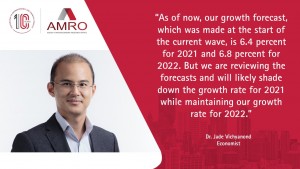
This interview first appeared on VnEconomy (in Vietnamese)
In this exclusive interview, AMRO’s Economist for Vietnam Jade Vichyanond discusses the country’s growth outlook and policy recommendations to weather the most serious wave of infections in the start of the pandemic.
The current wave of Covid-19 infections is accelerating in many parts of Vietnam, forcing cities and provinces to impose strict social distancing measures. These measures have led to a massive disruption in supply chains and deteriorate business resilience. What is AMRO’s forecast for Vietnam’s economy for the rest of 2021 and 2022? What would be the growth drivers?
Mobility restrictions due to the current wave of COVID-19 infections will continue to affect the service sector, which relies heavily on domestic demand. The agriculture and manufacturing sectors are also affected by the restrictions, particularly due to logistics challenges and factory closures. However, the strong recovery in global demand will partly offset the negative impact due to the significant role of exports in these sectors.
Exports will be one of the key growth drivers for the rest of 2021 and 2022. Another potential growth driver, although to a lesser extent, could be public investment, which helped support Vietnam’s growth in 2020. While it may be more challenging to accelerate public investment this year due to the greater severity of the current wave, it remains a crucial channel to help the government shore up economic recovery.
As of now, our growth forecast, which was made at the start of the current wave, is 6.4 percent for 2021 and 6.8 percent for 2022, but we are reviewing the forecasts and will likely shade down the growth rate for 2021 while maintaining our growth rate for 2022. The extent of the downward revision will depend on how long it takes for the containment measures to bring down the infection rate.
Currently, many firms have to temporarily shut down their factories or only operate in moderation. What do you think Vietnamese firms should do to overcome the current challenges and catch up with the economic recovery and demand globally in the coming months?
Prolonged disruptions in production could shift foreign demand to other countries temporarily, if not permanently. In the coming months, firms should cooperate with the government to implement safe distancing measures to contain infection among workers and should try to have them vaccinated as soon as possible. It is also crucial for businesses to minimize disruptions to production and explore new market opportunities for additional sources of growth, taking advantage of the free trade agreements (FTAs) that Vietnam has signed in recent years.
What should the Vietnamese government do to support businesses? What are short-term and long-term solutions?
The government should provide financial assistance (such as tax rebates, rental or wage subsidies, or soft loans) to support businesses which are affected by the containment restriction measures so that they can continue operating and remain solvent. Expediting vaccine delivery to employees and providing assistance to businesses in their efforts to comply with safe distancing measures will enhance businesses’ capability in maintaining operations. The government should also help firms overcome logistics-related hurdles that arise from containment measures, such as by prioritizing vaccination for those involved in transportation.
Fiscal support on both the revenue side, such as the existing policy of postponement in tax payments and reductions in fees and taxes, as well as the expenditure side, such as loan subsidies, can help companies tide over the challenges caused by the pandemic. At the same time, continued accommodative monetary policy is essential in maintaining affordable financing for businesses. The government can help boost domestic demand by providing financial support to affected and vulnerable households and boosting infrastructure spending.
As the pandemic still rages on, there are a lot of uncertainties in the months ahead. What should the government and businesses to do prepare for a long-term recovery and growth?
While strict enforcement of mobility restrictions and extensive contact tracing helped Vietnam contain COVID-19 relatively well in 2020, the current wave of infections has highlighted the urgency of vaccination. To safeguard the country from future waves of COVID-19 and its variants, and other types of pandemics, it is essential to recalibrate and enhance the pandemic containment strategy and expend more efforts on timely vaccination and other medical means of disease control.
To enhance the resilience and competitiveness of the economy, public investment is vital. With foreign direct investment flows into Vietnam expected to continue in the medium to long term, physical infrastructure and the institutional framework should be upgraded along with the growing needs and demands of businesses. Meanwhile, further efforts to develop domestic supporting industries are necessary to help strengthen the country’s participation and increase domestic value added in the global value chains, especially to take advantage of the reconfiguration of supply chains amid the pandemic.
AMRO’s 2020 Annual Consultation Report on Vietnam
